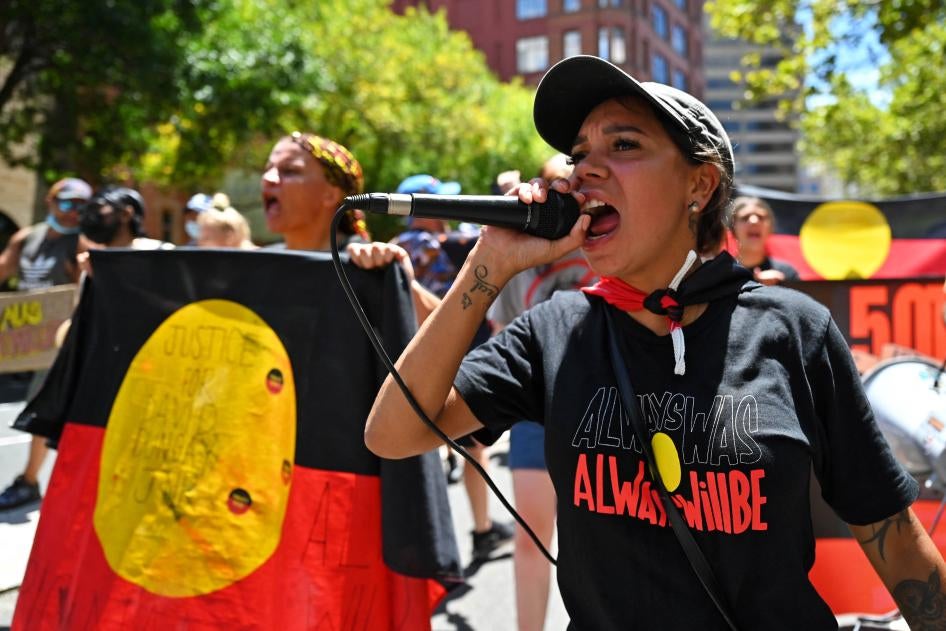(Jakarta) – The Australian government’s failure to uphold the rights of First Nations people and asylum seekers harms the government’s credibility to promote human rights in the region, Human Rights Watch said today in its World Report 2023. Similarly, the government’s continued support for fossil fuel expansion undermines its international standing on climate justice.
“The Australian government should recognize that its credibility to advance democracy and human rights in the region means urgently addressing its own deficiencies,” said Sophie McNeill, senior Australia researcher at Human Rights Watch. “The authorities are jailing children under 14, punishing peaceful environmental protesters with outrageous sentences, and mistreating Indigenous people in prison and asylum seekers.”
In the 712-page World Report 2023, its 33rd edition, Human Rights Watch reviews human rights practices in close to 100 countries. In her introductory essay, acting Executive Director Tirana Hassan says that in a world in which power has shifted, it is no longer possible to rely on a small group of mostly Global North governments to defend human rights. The world’s mobilization around Russia’s war in Ukraine reminds us of the extraordinary potential when governments realize their human rights obligations on a global scale. The responsibility is on individual countries, big and small, to apply a human rights framework to their policies, and then work together to protect and promote human rights.
In 2022, disturbing revelations emerged regarding conditions inside Australia’s prison system. The state government in Western Australia refused to install air conditioning in residential cells at Roebourne Regional Prison, even though temperatures reached a record high of 50.5 degrees Celsius (123 degrees Fahrenheit), last year, posing a significant risk to prisoners’ health. Ninety percent of the prison population at Roebourne are First Nations people. In November, following public pressure from the Aboriginal Legal Service, Human Rights Watch, and others, the state government backtracked and said it would install air conditioning, but not until after this summer.
Prison and detention center conditions in the country remained a concern. In October, the United Nations Subcommittee on Prevention of Torture suspended its visit to Australia due to obstructions it encountered in visiting several detention sites in Australia and accessing requested documentation.
Indigenous people are significantly overrepresented in the criminal justice system, with Aboriginal and Torres Strait Islander people comprising 29 percent of Australia’s adult prison population, but just 3 percent of the national population. At least 17 Indigenous people died in custody in Australia in 2022, and 11 in 2021. An estimated 444 children under 14 were imprisoned in the past year across Australia.
Indigenous children are 20 times more likely to be incarcerated than non-Indigenous children. In Australia, the minimum age of criminal responsibility is 10, lower than the internationally accepted age of 14.
The government of Prime Minister Anthony Albanese has also failed to meet Australia’s obligations under international human rights law to prevent further foreseeable harm linked to the climate crisis. Australia is among the top 20 emitters and one of the world's biggest per capita emitters of greenhouse gases responsible for the climate crisis.
The Albanese government has actively supported the expansion of fossil fuels industries, denying responsibility for emissions created by the vast amounts of coal and gas Australia exports overseas and ruling out any discussion on banning new fossil fuel projects.
The state of New South Wales introduced new laws and penalties specifically targeting climate protesters, punishing them with hefty fines and up to two years prison for protesting without permission in violation of international law.
Human Rights Watch research found that the authorities in New South Wales were disproportionately punishing climate protesters in violation of their rights to peacefully protest. Magistrates were imposing harsh and excessive penalties and bail conditions on climate protesters. New anti-protest laws passed in the states of Victoria and Tasmania also invoke severe penalties for nonviolent protest.
By turning back a boat carrying asylum seekers just days after the nationwide election in May, the Albanese government signaled its intention to continue the “turn-back” policy of interdicting boats and summarily forcing them away from Australian territory and returning the people on-board to countries of departure or origin. The government has since confirmed that it has no plans to end the policy of offshore processing of asylum seekers.








